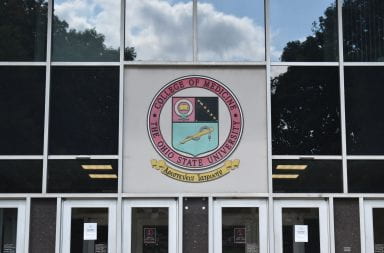
Ohio State identified roughly 300 invalid tickets at the Michigan vs. Ohio State football game Nov. 24. Credit: Casey Cascaldo | Photo Editor
When buying tickets for Ohio State athletic events, be careful where you’re spending your money.
That’s advice roughly 300 people wish they would have known before buying tickets for the Ohio State-Michigan game on Nov. 24, when they were denied entry to the game after unknowingly using counterfeit tickets. Ohio State is now taking a step to ensure that doesn’t happen again.
Due to the abundance of counterfeit “print-at-home” tickets, Ohio State’s ticket office will no longer be offering the option to print out a PDF-style ticket, effective beginning the winter sports season.
“A step we’ve taken moving forward is we’re eliminating the option to print tickets to PDF, which is where industrywide a lot of the counterfeit tickets are being seen,” Kate Nushart, director of ticket operations and analytics at Ohio State, said. “What we’re doing moving forward is allowing customers to either use traditional, hard tickets that we would print or that Ticketmaster would print, or their mobile phone for entry.”
Ohio State athletics encountered approximately 300 invalid tickets to the big game, from tickets previously reported lost or stolen to outright counterfeits, Brett Scarbrough, associate athletic director for Ohio State’s ticket office, said.
“What we’ve seen recently is manipulation of print-at-home style tickets. So tickets that are printed in a PDF format, printed on a home computer, those are very easy to manipulate,” Scarborough said. “Fans that don’t have a trained eye can easily get duped.”
On Nov. 20, the Department of Athletics issued a press release warning fans about the abundance of fraudulent ticket sales, especially in the print-at-home format. The release suggested purchasing tickets from authorized sellers and covering their barcodes when sharing pictures of tickets on social media. Authorized sellers for game day tickets are Ticketmaster, the Ohio State ticket office and the Ohio State ticket exchange.
“The problems that we see around the larger games are basically fans that purchase from unauthorized sites,” Scarbrough said. “Unauthorized sites could be StubHub, eBay, Craigslist — anywhere that’s outside of the authorized places to purchase tickets.”
Every year, the athletic office utilizes many resources in an attempt to educate fans about how to reduce the possibility of purchasing fraudulent tickets.
Nushart said that during the week before the game, the ticket office sends emails to ticket holders, encouraging mobile delivery. She added that the office encourages covering the barcodes when posting on social media.
“We also do social media campaigns leading up to the games and the start of the season,” Nushart said.
Despite the university’s best attempts to educate fans, the accidental purchasing of counterfeit tickets is an ongoing problem, especially for larger games.
This issue often sparks intense emotions for fans and employees alike. Scarbrough explained that when a counterfeit ticket is scanned at the gate, sometimes it simply doesn’t work. Other times, the barcode will be valid, but the seat information has been altered to seem more appealing, therefore increasing the price. You may think you get a spot at the 50-yard line, but in reality, your seat is up in C-deck.
“It is an emotional situation, they’ve put out a lot of money, oftentimes there are little kids involved,” Scarbrough said. “It’s probably the worst part of our job.”


